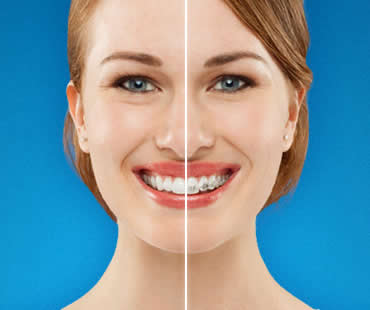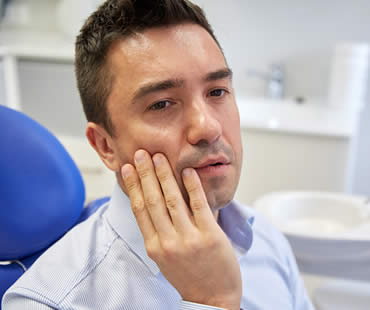
Let’s face it. When you talk about straightening teeth, images of middle school kids with mouths full of metal and colored bands come into your mind. As an adult, those images might give you nightmares if you imagine it for yourself. But what if you have crooked teeth or problematic bite issues? What are your teeth-straightening choices that won’t embarrass you? Invisalign is the answer and is often the right choice for adults seeking to straighten their teeth.
Invisalign is a system by which a series of clear plastic trays, or aligners, are worn for a minimum of 22 hours each day, gradually straightening your teeth without metal brackets or wires. As each tray completes its alignment, another tray is applied to continue your smile transformation.
The clear plastic aligners allow for discrete use for adults, especially in professional or interpersonal situations. It enables the wearer to function professionally without losing any kind of credibility because of negative perceptions of metal braces. You’ll eat with confidence on dates or at business dinners because the aligners are removed for eating meals. After rinsing your mouth with water, simply pop the aligner back in and allow your smile to straighten.
You’ll also take out the aligners each time you brush your teeth. This enables you to thoroughly clean your mouth and teeth and makes flossing a snap. Flossing with traditional braces takes a long time and can be difficult, even for adults. Choosing Invisalign as an adult allows you to have a healthier mouth and therefore fresher breath.
These and other benefits are possible with Invisalign. Visit your orthodontist to begin learning about all the advantages that Invisalign can offer you as an adult looking to have straighter teeth.
Schedule your appointment at our Lawrence MA dental office

Kids don’t always play it safe or make the best decisions when it comes to protecting their teeth. Tooth decay and mouth injuries are just a couple of things parents must worry about for their kids, whether it’s the elementary school or college years. Here are some simple ways that parents can teach their kids to protect their teeth.
Limit sports and energy drinks.
Sports and energy drinks are both heavily marketed toward today’s youth. It is true that sports drinks help replace electrolytes during exercise, but many people drink them too much or outside the exercise realm. Experts have deemed sports drinks to be unnecessary in the lunchroom or as a snack on the playground. The high acid levels in these drinks can erode tooth enamel, with energy drinks determined to cause twice as much damage. It is recommended to save sports drinks for very strenuous activities, and instead stick with water for hydration and refreshment without the negative effects.
Insist upon mouthguards.
Parents should provide mouthguards for kids in nearly any sport, even if it isn’t considered mandatory by the school or team. Mouthguards can prevent chips, fractures, or knockouts of teeth, as well as protect the soft tissues of the mouth. According to research estimates, 3 million teeth were knocked out in youth sports in 2011. Dentists suggest that athletes who don’t wear mouthguards are 60 times more likely to sustain oral injury. Inexpensive basic mouthguards or the boil-and-bite variety are available at sporting goods stores, or customized mouthguards can be purchased through your dentist.
Say no to oral piercings.
Although it applies primarily to teenagers and older, the Academy of General Dentistry advises against oral piercing for active people. Those with piercings should remove them before participating in sports, because puncture wounds can lead to infections related to increased blood flow and breathing rates during exercise. If your child is considering and oral piercing, make sure you discuss the risks and need for removal during physical activity.
If you need a dentist in Lawrence MA contact us today

Teaching your kids good dental habits and making sure they get dental care are some of the most important things you can do for them. Guidelines for helping your child improve their oral health depend upon their ages. Here are some oral health tips for various stages of childhood.
Infants (up to 2 years):
It’s never too early to begin oral care! Clean your baby’s gums with a damp cloth after feedings to remove bacteria. Once the first tooth erupts, use a soft toothbrush for babies to gently brush the teeth and gums. Use a pea-sized dab of toothpaste and brush at least twice a day. Around the first birthday, begin taking your child to the dentist for regular checkups.
Preschoolers (2-4 years):
This age group has the highest incidence of tooth decay, because most preschoolers love sugary foods but may not love brushing their teeth. Brush your child’s teeth yourself until they are old enough to do it well, but continue supervising the process to make sure all areas are clean. Consider flavored or character fluoride toothpastes if it encourages your child to brush. Also, limit the amount of sugary foods and drinks your child consumes.
Young elementary (5-7 years):
As more and more teeth grow in, your child needs to brush carefully with fluoride toothpaste. Make sure all areas of your child’s mouth are being reached, and help your child use dental floss to clean between teeth and gums. Continue helping your child make healthy diet choices.
Older kids (over 8 years):
Most children should be able to brush on their own by age 8, but performing spot checks is a good idea to make sure they are doing a good job. Teach your child to brush after meals, especially when eating sugary or sticky foods, and emphasize the importance of flossing every day. Continue taking your child for regular dental checkups every six months, which will help create a life-long habit of good oral care.
If you live in the Lawrence MA area contact us today

If you are about to undergo root canal treatment to save a compromised tooth, your oral surgeon or dentist will likely provide you with a list of aftercare instructions. It is vitally important that you follow these recommendations to avoid complications and ensure the success of your endodontic treatment.
There are a few tips you can follow to speed up your recovery time, promote healing, and prevent serious dental problems and infections following root canal treatment:
- Do not chew on the treated side of your mouth until all of the numbness from the anesthetic has worn off completely.
- To manage swelling, apply an ice pack or bag of frozen peas on the treated area for thirty minutes. Repeat once an hour for about fifteen minutes each time until swelling subsides.
- For several nights after treatment, keep your head elevated while sleeping.
- Gently rinse your mouth with warm salt water regularly for the first few days after root canal treatment.
- Refrain from smoking for a minimum of 24 hours and try to curb tobacco usage as much as possible during the healing period.
- Avoid strenuous physical activity or exercise for 48 hours after your root canal procedure.
Contact your dentist immediately if you experience any excessive swelling or pain, the appearance of a rash or hives, or a return of original symptoms. By listening to the recommendations of your dentist, and following these extra tips, you can assure yourself the best chance of a rapid and complication-free recovery from root canal treatment.
If you need a dentist in Lawrence MA contact us today

If root canal treatment has been recommended for you, you’re probably a little nervous. Maybe you’re a LOT nervous, but if you’re thinking about putting off your treatment, don’t. If you need root canal therapy, the underlying conditions that necessitate it will not go away left untreated. In fact, they’ll just get worse and worse over time, causing you more pain and discomfort and potentially leading to more serious complications.
If you don’t treat the infection in your tooth, it will spread. Beginning at your tooth’s roots, it will travel to your jawbone and eventually to your healthy teeth. Your entire jawbone can be put at risk. By treating your infection promptly with root canal therapy, your mouth can be free of infection and you will begin the process of healing.
Serious diseases like heart disease and diabetes have been directly linked to gum disease. During pregnancy, many problems including low birth weight and premature birth can occur as a direct result of infection and bacteria in the mouth. Several types of cancers have all been shown to have a link to poor overall oral health. The mouth is truly the pathway for everything that goes into the body, and if it’s providing a steady stream of bacteria and infection to be spread throughout your body, it’s extremely problematic.
Don’t worry about pain following your procedure. Root canal therapies are meant to relieve pain, not cause it. You’ll be surprised how much better you’ll feel after your mouth is infection-free.
If you ignore your infected tooth for long enough, it may either fall out on its own or need to be extracted. Missing teeth come with a long list of oral issues, including difficulties with bite alignment and speech only corrected with some kind of dental restoration.
Don’t wait to have your root canal treatment. Don’t open yourself up to the myriad of consequences that could result from postponing treatment.
Schedule your appointment at our Lawrence MA dental office

Having tooth pain or problems can be one of the most uncomfortable experiences possible. It is hard to ignore because it makes your whole quality of life worse. When infection or decay reaches the inner parts of your tooth, it can cause many miserable symptoms. Often the key is getting root canal treatment to save your tooth and alleviate your symptoms. Here are some warning signs that indicate you might need this type of treatment.
Severe pain:
Although not always present, severe pain sometimes occurs with a tooth that needs root canal therapy. It may be sharp, intense pain or a dull ache that won’t subside. If you experience tooth pain that is severe or lasts for several days, see your dentist for an evaluation. If root canal treatment is necessary, any pain you may have will likely disappear after a successful procedure.
Sensitivity to hot or cold:
Discomfort when consuming hot or cold items is another sign of a problem. Mild sensitivity is usually not a big deal, but actual pain when your tooth hits these temperatures may mean the tooth is in an advanced stage of trouble.
Gum tenderness or inflammation:
Swelling or tenderness is often associated with infection, although it doesn’t always mean infection is present. Your dentist can determine the seriousness of the issues and whether root canal treatment is advised. Watch for tenderness, swelling, or even a lump in the affected area.
Darkened tooth:
Discoloration is a sign that the nerves of a tooth are damaged. The tooth may become gray, black or dark yellow. Tooth discoloration is also related to trauma, damaged fillings or severe decay, so visiting your dentist for a checkup is recommended.
Gum boils:
If lesions similar to a pimple form in the gum tissues, it is called a gum boil. It is usually an accumulation of pus, which can be linked to infection. The boil may be larger or smaller at certain times, depending on the activity of the infection in your mouth. It will feel tender and can cause swelling in the area, and you may notice a bad taste in your mouth.
If you have symptoms such as these, see your dentist to learn if root canal treatment is the solution.
If you need a dentist in Lawrence MA contact us today










